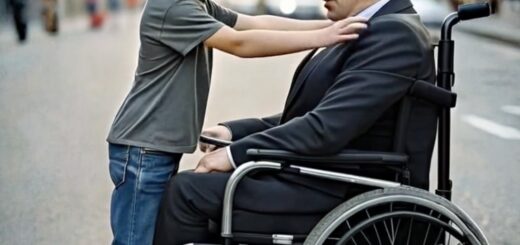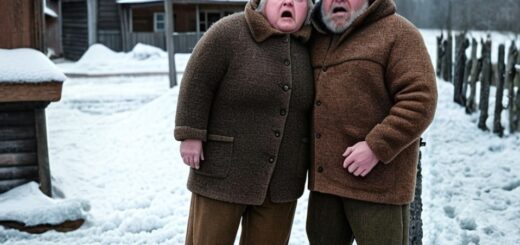“Avoid attending your spouse’s burial. Inspect your sibling’s residence…”…
Just sat on the floor in the hallway listening to the phone ring. After an hour, the calls stopped. They probably decided I was unwell.
That I was in the hospital or somewhere. Probably the funeral went on without me. The funeral of an empty casket.
I got up from the floor and went to the bedroom. Our bedroom with Paul, where his things still lay, where our shared photos still hung. All of it now seemed like set pieces for a play.
I sat on the bed and tried to understand what had happened in the last weeks. Paul’s illness, his death, funeral preparations – was it all real or a game? Paul got sick a month ago.
First complained of fatigue. Then chest pains. I made him go to the doctor.
The doctor said it was stress, prescribed pills and rest. But Paul got worse. Then the ambulance call, hospital, ICU.
Doctors talked about heart failure, that it was very serious. I spent days and nights at the hospital. Paul lay under IVs, pale, weak.
We hardly talked; he slept all the time or pretended to. And three days ago, the hospital called and said Paul died at night, in his sleep. His heart gave out.
I remember dropping to the floor when I heard the news. Remember screaming, unable to believe it. Remember driving to the hospital and seeing his body under a white sheet.
But now I understood that too could be a spectacle. Bribed doctors, fake documents, a stranger’s body in the morgue. Anything is possible with money and connections.
And Paul had both money and connections. He worked in a construction company, handled big contracts. He had friends in city hall, in hospitals, in the police.
If he wanted to disappear, he could arrange it. But why? I stood and went to the window. Outside was ordinary life: people going about their business, kids playing in the yard, dogs running between trees.
No one knew my world had just fallen apart. The phone rang again. Emily’s name flashed on the screen.
I stared at the screen a long time, undecided whether to answer. What would she say? Pretend to grieve? Ask why I didn’t come to the funeral? I answered. Emily’s voice sounded agitated, almost hysterical.
She said she’d looked for me everywhere, that everyone was worried, that the funeral went on without me, and they thought something happened to me. She said she was coming over now, that we needed to talk. I listened to her voice and tried to understand if she knew I’d seen them together? Or thought her secret was safe? Emily arrived half an hour later.
I opened the door and saw her red eyes, disheveled hair, black dress. She looked like someone who’d just buried a loved one. She hugged me and cried.
Said she understood my grief, that she was barely holding on, that Paul was like an older brother to her. Said we should support each other in this hard time. I stood in her embrace and felt rage growing inside me.
How could she act like this? How could she look me in the eyes and lie? But I said nothing. Just listened to her words and nodded. Because I didn’t know what to do with what I’d learned.
Didn’t know how to use this information. Emily stayed the whole evening. We sat in the kitchen, drank tea; she told about the funeral.
How beautifully everything was organized, how many people came to say goodbye to Paul, how everyone asked about me. She said Paul’s mother was very upset by my absence. That Paul’s brother was angry and said it was disrespect to the deceased’s memory.
That friends didn’t understand what could have happened. «Mary, you need to explain to them,» Emily said. «Call, apologize.
Say you felt unwell, that you were in shock. They’ll understand.» I nodded, thinking how well she played her role.
Caring sister worried about the widow’s reputation. No one would suspect she slept with the deceased while he was being buried. When Emily left, I locked the door and sat to make a list.
A list of everything I needed to find out. A list of questions needing answers. How long had Paul and Emily been together? Who else knew Paul was alive? How did they organize the fake death? Why did they need this? What did they plan next? And the main question: what should I do with this knowledge? I could go to the police and tell everything.
But who would believe me? They’d say I’d gone mad from grief, that it was a hallucination. And if Paul really bribed doctors, he had an official death certificate. There are documents, witnesses.
I could return to Emily’s house and cause a scene. Burst in when they’re together and demand explanations. But what would that give? They’d just say I’m crazy.
Or I could pretend I knew nothing. Continue playing the grieving widow and quietly gather evidence. Uncover the whole truth, then strike so they couldn’t wriggle out.
The last option seemed the most sensible. I hid the letter in a jewelry box and went to bed. But sleep wouldn’t come.
I lay in the dark thinking tomorrow a new life would begin. A life where I’d pretend not to know the truth. A life where I’d plan revenge.
In the morning, Paul’s mother called. Her voice was cold, offended. She said she didn’t understand how I could miss my own husband’s funeral.
That it was a shame for the whole family. That people were saying things. I apologized.
Said I’d felt unwell, passed out, and woke up only in the evening. Said I wouldn’t forgive myself. She softened a bit.
Said she understood my grief but I should have warned. That she worried, thought something happened to me. We agreed to meet the next day.
She wanted to give me Paul’s things from the hospital and discuss inheritance. After talking to her, Paul’s brother called. Then friends.
All said the same: they understood my grief but my behavior was strange. All demanded explanations. I explained.
Apologized. Played the role of a woman nearly driven mad by losing her husband. And with each conversation, I became more convinced Paul was dead only to me.
To everyone else, he was truly dead and buried. Meaning the plan was thought out to the smallest detail. In the afternoon, I went to the cemetery.
Wanted to see the grave dug yesterday for the empty casket. The grave was fresh, soil not yet settled. Wreaths and flowers lay on the mound.
On the temporary marker: «Paul Smith, 1978-2023. Loving husband and son.» I stood at this grave thinking an empty casket lay underground.
Or a casket with a stranger’s body. And my husband was drinking coffee in my sister’s kitchen at that time. Next to the grave stood an elderly woman with flowers.
She looked at me and shook her head. «You’re probably the wife?» she asked. «You weren’t at the funeral yesterday.»
People were saying things. I nodded. «I understand,» the woman said.
«Losing a husband at such an age is hard.» Mine left early too. But you should have come to the funeral.
For people, for memory. She laid flowers on the neighboring grave and left. I stayed alone.
Stood at the fake grave of my living husband and tried to understand what I felt. Anger? Pain? Relief? Probably all at once. In the evening, I sat home thinking about tomorrow.
About meeting Paul’s mother, getting his things, discussing inheritance. Pretending to grieve. Playing the widow’s role.
And Paul would live a new life with Emily at that time. Free, happy, rid of the tiresome wife. But he didn’t know I knew the truth.
And that was my only advantage. I woke up the next morning on the floor in the hallway. Neck hurt, back ached, head pounded like a hammer.
For the first few seconds, I didn’t remember where I was or what happened. Then it all came back: the letter, Emily’s house, Paul at the kitchen table. Alive Paul.
I got up, straightened the black dress I hadn’t taken off, and looked at the clock. Six thirty in the morning. In three hours, I needed to be at Paul’s mother’s, picking up his hospital things and discussing inheritance.
I went to the bathroom. Looked in the mirror and was horrified. Red eyes, smeared mascara, hair like after a hurricane.
This is how a woman who lost her husband looks. Perfect image for what I had to do. Because I decided to play.
I don’t know when this decision matured in my head. Maybe at night, when I lay on the floor thinking what to do next. Maybe in the morning, when I saw my reflection.
But I knew for sure I wouldn’t immediately run to Paul and Emily with screams and accusations. I’d play the grieving widow. Gather information.
Find out why they needed this spectacle. Then strike so they couldn’t recover. I showered, put on makeup, but not too much; I needed to look pale and exhausted.
Put on another black dress, stricter. Took my purse with that letter inside and drove to Paul’s mother’s. Valerie lived in an old house in downtown Chicago.
The house where Paul grew up, spent his childhood and youth. I’d been there many times, but today everything seemed different. Every photo on the walls, every item reminded me of the man who deceived me so cruelly.
Valerie met me at the door. She was in black, hair neatly styled, face stern. But when she saw me, her expression softened.
She hugged me and said she understood my grief. That she was barely holding on after losing her son. That we should support each other in this hard time.
I allowed myself to cry. Didn’t even have to pretend; tears flowed on their own. But I cried not for Paul’s death, but for the death of my old life.
We sat in the living room, and Valerie started telling about yesterday’s funeral. How many people came to say goodbye to Paul. How beautifully everything was organized.
How everyone asked about me. She said she understood it was hard for me. That losing a husband at such an age is a terrible blow.
But that people expected explanations. That I should have at least warned. I apologized.
Said I didn’t remember what happened to me. That I woke up only in the evening and realized I’d missed the most important thing in my life. Valerie brought a box with Paul’s things from the hospital.
His watch, ring, wallet, phone. I took the phone and turned it on. The last messages were from me; I’d written him on the day of death.
Asking how he felt. He didn’t reply. Now I understood why.
Valerie took out a folder with documents. Will, insurance, bank accounts. She explained what needed to be filed, what certificates to get, which lawyers to contact.
I listened and nodded, thinking all these papers were part of the spectacle. That somewhere there were other documents, real ones, showing where the money really went. Then Paul’s brother, Steve, arrived.
He was older than Paul by five years, worked in city administration. Serious man with gray temples and stern gaze. Steve hugged me and said he’d been very worried yesterday.
Thought something happened to me. That he even wanted to drive to my house, but Valerie stopped him. He sat next to me and started talking about how he’d miss his brother.
That Paul was the best person he knew. That such people shouldn’t die so young. I listened to these words and felt anger growing inside me.
How could he say that about a man who faked his own death? Didn’t he know the truth either? Or did he know but played his role? Steve took out another folder with inheritance documents. He explained the house and car went to me. That there was a bank deposit and insurance.
That everything was properly filed, no problems. But when he opened the insurance policy, I saw something that made my heart stop. In the list of beneficiaries were two names.
Mine, for 70 percent. And Emily’s name, for 30. I stared at that line and couldn’t believe my eyes.
When did Paul add Emily to the insurance? And why? Steve noticed my surprise and explained Paul changed the policy two months ago. Said he wanted to help Emily; she’d recently widowed, lived alone, little money. Two months ago.
Meaning they’d planned this back then. I asked if it wasn’t strange to include the wife’s sister in the insurance? Steve shrugged and said Paul was always kind.
That he considered Emily a younger sister and wanted to take care of her. Valerie agreed. Said Paul often talked about Emily.
That he worried about her after her husband’s death. That he wanted to help her get on her feet. I nodded and smiled, but inside I was boiling.
Meaning they weren’t just sleeping together. They were planning my future. Deciding how much money to leave me.
And how much to take for themselves. We sat at Valerie’s until lunch. She told stories from Paul’s childhood, showed old photos, cried over his school notebooks.
Steve talked about his brother’s work, his plans, how he wanted to buy a cabin and raise rabbits. It was all very touching. If I hadn’t known the truth.
But I knew the man they spoke of with such love was sitting in my sister’s house at that moment, planning how to spend the insurance money. When I was leaving, Valerie gave me another box. It had Paul’s personal things: books, CDs, some papers.
She said she couldn’t look at them, that it’d be easier for me to sort everything myself. I took the box and drove home. On the way, stopped at a store and bought groceries.
Needed to maintain the appearance of normal life. In the store, neighbor Linda stopped me. Elderly woman who knew everyone and everything in our neighborhood.
She expressed condolences and said she’d been very worried when she learned of Paul’s death. Then she leaned closer and whispered if it was true I wasn’t at the funeral. That people were saying things: some said I was in the hospital, some that I’d quarreled with husband’s relatives.
I explained I’d felt unwell. That I’d passed out and woke up only in the evening. Linda nodded understandingly, but I saw doubt in her eyes.
At home, I put the box on the table and started sorting the contents. Books Paul read in recent months. CDs with music.
Old photos. Nothing special. But at the bottom, I found a notebook.
Ordinary grid notebook, half filled. I opened it and saw Paul’s notes. Most were ordinary: reminders of meetings, phone numbers, shopping lists.
But on the last pages was something else. Dates. Money amounts.
Names of people I didn’t know. And at the very end – a plan. Detailed plan of how to fake death….
























